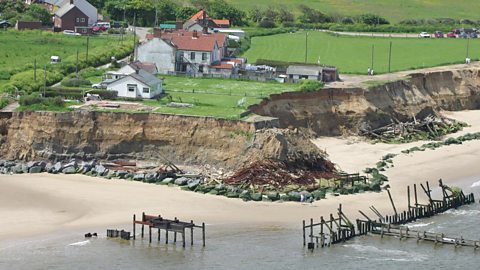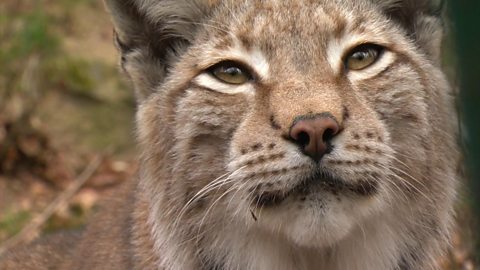Oliver: Hi. My name is Oliver. I’m 13 and I live in north Norfolk. I’m doing some research into intensive farming. Three quarters of the land in the UK is used to grow crops and that’s why I want to find out if our farming methods are good for the environment.
Oliver: Intensive farming from what I know is where farmers take animals, crops, compress them into small spaces. Feeding them, treating them with different chemicals to make them grow faster. With crops it’s spraying them with pesticides and herbicides to stop insects eating them and destroying them by killing them.
Oliver: You see I love food, but I don’t want it sprayed with pesticides that can harm me if I don’t cook it or treat it properly.Intensive farming. Is intensive farming the right way to produce our food?
Oliver: I’m off to meet Richard, an intensive farmer. He uses chemicals to grow crops.
Oliver: I’m Oliver.
Richard Hirst: Hello Oliver, I’m Richard.
Oliver: So a lot of people are against intensive farming but what is your definition of it?
Richard Hirst: Well I think the use of the word intensive for farming is wrong to start with. To me it’s about maximising as much as we can for the land that we have to produce as much as we can.
Oliver: So I’ve read from multiple sources that people don’t agree with using chemicals and think we shouldn’t. Why do you think that people would say that?
Richard Hirst: All the chemicals that we use have to go through a really rigorous process. It takes ten, twelve years from a scientist identifying this chemical will do whatever it does until we can use it. And we use chemicals for three things. We use them to control fungal diseases, we put fungicides. Insects are another big problem for us. The aphids, those little green and black fly, they can transmit diseases, viruses in particular.
Richard Hirst: We’ve had fields of wheat where we haven’t sprayed them for aphids for some years and we’ve lost nearly 50% of the yield. And it will just kill the aphids. It won’t kill things like butterflies and ladybirds and bumblebees and all those beneficial insects. They’re very selective. And then finally we control weeds. So it’s important that we control those as well.
Richard Hirst: But we have a population at the moment in the world that’s 7.5 billion, due to be 9 billion in 15, 20 years’ time. We cannot feed that population by not using chemicals.
Oliver: So I just met Richard and he showed me round his farm. It looked really interesting. It’s changed my perception on intensive farming. I still need to hear the other side of the story.
Oliver: Yes. Now I get to meet someone who doesn’t use chemicals and farms organically.
Joe Rolfe: Hello there, I’m Joe. It’s very nice to meet you.
Oliver: It’s nice to meet you too.
Oliver: Joe’s farm produces lots of organic vegetables but mainly carrots. He sells six million bags of them a year. So how do you protect your crops without any chemicals?
Joe Rolfe: We’re trying to create a healthy soil. We’re looking at the bacteria and the fungi that live in the soil. By not applying chemicals and by having a longer rotation allows all of those things to thrive.
Oliver: Crop rotation involves changing what crops are grown in fields each year for a period of time to keep the soil healthy and full of all that good bacteria and fungi.
Joe Rolfe: It is my belief that the more diverse your rotation is the less issues you’ll have in terms of pest disease and weed problems.
Oliver: So are pests your biggest problem here on the farm?
Joe Rolfe: They are a big problem but probably our biggest challenge is controlling weeds. If you think of a weed as being competition, weeds obviously compete for light, water and nutrition, energy.
Oliver: So without chemicals how do you manage to get rid of weeds? Do you have to take them out yourselves by hand?
Joe Rolfe: We do, yes. But for me organic farming and being good at organic farming means you farm preventatively. So if there’s a weed in your crop and you’re having to deal with it you’re kind of too late.
Oliver: Your methods are really interesting on how to farm organically. But the big question is can you feed the entire population of the UK using organic farming?
Joe Rolfe: I believe that yes, it is possible. But if you go into a supermarket and you pick up my bag of carrots it will cost you £1. If you go into the supermarket and pick up a bag of conventional carrots it’ll cost you 60p, 50, 60p. So essentially on the scale that we grow we don’t have necessarily the efficiencies that you would have on a large scale farm. But through scale and innovation and forward thinking we can grow more from less. Become more sustainable and essentially make what we do more affordable for more people. That’s the ultimate aim. I’d like to see everybody eating organic food in the future.
Oliver: So what you’re saying is your carrots taste pretty good?
Joe Rolfe: Well why don’t we try some and see what you think?
Oliver: Yeah.
Joe Rolfe: Down as hard as you can. That’s it, you got it. And then pull it back, that’s it. Look at all those, look.
Oliver: Here goes my first organic carrot also straight from the ground. Mmm it’s very good.
Oliver: Both Richard and Joe have strong arguments for and against intensive farming. I’d really like to talk to someone who’s researched both sides of the argument before I make my mind up.
Oliver: Ah, just the person who’s an expert on plant health. So hopefully he can help me understand the science of farming.
Oliver: Hi, I’m Oliver.
Phil Smith: Hi Oliver, I’m Phil.
Oliver: So what is your opinion? Do we need to use chemicals or can we do this organically?
Phil Smith: So maybe science can help. Maybe we can think about improving how we actually apply these chemicals that farmers say they need to apply so that they use less of them. We have less problems with them running off into our rivers or less problems with them persisting and going into the food chain and the food that we eat.
Oliver: So what you’re saying is intensive farming is OK as long as we keep finding new ways to protect us from the impact of intensive farming?
Phil Smith: That’s exactly right, yeah. We don’t question that we need to produce more food. It’s a question of how. And so one way to do that that you’ve probably not heard about so far is actually breeding of crops to make them higher yielding. So this kind of cuts out the application of chemicals but is still improving the plant. And so that has less environmental impact. All these things will help us in terms of feeding a global population.
Oliver: It’s more complicated than I originally thought.
Oliver: At the beginning of this I met two wonderful farmers. Richard being a non-organic farmer using chemicals and Joe who was an organic farmer who used zero chemicals. They were both really strong arguments and I talked to Phil who was a plant doctor to help solidify my opinion. So I believe that intensive farming is the way we’re going to have to feed the population unless organic farming can find a solid way to produce cheap and reliable food.
Oliver, a student from North Norfolk, looks into whether intensive farming is the right way to produce our food.
Oliver talks to Richard, a farmer who uses chemicals to help grow vegetables, mainly to control diseases, insects and weeds.
Richard believes it is impossible to feed the UK population without using some chemicals.
Next Oliver meets Joe, a carrot farmer who runs an organic farm.
Joe describes the advantages of organic farming and explains why growing without chemicals makes his carrots more expensive than those produced on intensive farms.
Finally, Oliver meets a plant expert, who looks at both sides of the argument.
This clip is from the series Geography: The Big Issues.
Teacher Notes
This could be used as part of a research project into food production and the challenges of feeding the world’s population.
Students could identify inputs into each type of farm visited.
Students could look at different examples mentioned in other parts of the world to compare them.
Students could also take it further and look at issues of increasing competition for space and even more innovative approaches to farming like hydroponics and vertical farming.
Curriculum Notes
This clip will be relevant for teaching Geography at Key Stage 3 and 4 in England, Wales and Northern Ireland and 3rd and 4th Level (S1/S2/S3) in Scotland.
More from the series Geography: The Big Issues
Geography KS3/4: Controlling traffic pollution video
A student examines the pros and cons of using a congestion charge to control traffic pollution.

Geography KS3/4: Coastal Erosion. video
A student investigates whether we should protect properties being affected by coastal erosion.

Geography KS3/4: Rewilding. video
A student investigates the pros and cons of rewilding, looking at moves to reintroduce the lynx to Kielder Forest.
